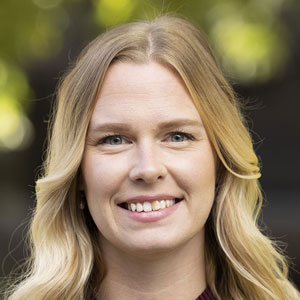Educational Psychology
Online Doctor of Philosophy (Ph.D.)
Improve educational processes by exploring how people teach and learn.
Learning isn’t exclusive to schools. People learn continuously throughout their lives, across multiple contexts. Understanding how they learn and how others support that learning is the goal of educational psychology. The field’s emphasis on the nature of teaching and learning differentiates it from school psychology, which focuses on individual student support.
Our interdisciplinary program focuses on theory and research methods exploring the learner, the instructor, and the context for learning. You’ll delve into topics like learning theories, motivation, human development, cognitive processes, and the role of culture in learning inside and outside the classroom. Our expert faculty will introduce you to a range of contemporary issues, informed by their expertise in reading motivation and engagement, language and literacy processes, culturally responsive models of teaching and learning, and the intersection of social-emotional needs with learning.
Credit hours required
51
Application Deadlines
| Term | Deadline |
|---|---|
| Fall | April 1 |
| Spring | October 1 |
| Summer | April 1 |

What Can I Do With a Ph.D. in Educational Psychology from NIU?
As you investigate teaching and learning processes, you’ll build your knowledge of theory and gain research skills, expanding your access to a variety of career pathways. Our graduates excel in leadership, teaching, research and related positions in educational settings, as well as government and nonprofit organizations. Their recent dissertations have addressed a range of interdisciplinary topics, including students’ experiences with online learning during COVID, the implementation of a garden-based science curriculum, approaches to support college students’ conceptual change, and teachers’ coping responses to job demands.
Learn How We’ll Support Your Success >>
Notable Alumni
University Faculty
- Anas Alhudib, Ph.D., 2024, assistant professor, psychology, Imam Abdulrahman Bin Faisal University
- Elyzia Powers, Ph.D., 2022, assistant professor, behavioral sciences and criminal justice, Minot State University
- Nancy Prange, Ph.D., 2021, clinical assistant professor, director of graduate studies, nutrition and dietetics, Northern Illinois University
- Sean Tikkun, Ph.D., 2018, associate professor, curriculum and instruction, North Carolina Central University
- Jenn Jacobs, Ph.D., 2016, associate professor, sport and exercise psychology, Northern Illinois University
- Solanlly Ochoa Angrino, Ed.D., 2012, professor, social sciences, Pontíficia Universidad Javeriana, Cali, Colombia
- Kevin Volkan, Ed.D., 1987, professor, psychology, California State University Channel Islands
Higher Education Leadership
- Christopher Mitchell, Ph.D., 2023, director, NIU Center for Black Studies
- Anne M. Edwards, Ph.D., 2021, director, Black Cultural Center, Purdue University
- Michelé Smith, Ph.D., 2020, vice president of workforce solutions and strategic alliances, Harper College
Government and Politics
- Aldo Rodríguez, Ph.D., 2018, director of language policy, National Education Administration of Uruguay
- Litesa Wallace, Ed.D., 2013, policy consultant, Taylor Uhe LLC; past state representative for Illinois' 67th legislative district
Institutional Research and Assessment
- J. Schwartz, Ph.D., 2017, division of research chair and assistant professor of research, Concordia University Chicago
- Lisa Mehlig, Ed.D., 2013, executive director of assessment/outcomes and HLC liaison, Rock Valley College
- Judith Murphy, Ed.D., 2003, research analyst, College of DuPage (retired)
K-12 Teaching/Leadership
- Kevin Cox, Ph.D., 2024, special education teacher, Waubonsee Valley High School
- Brian P. Hurley, Ph.D., 2024, instructional coach, South Cook Intermediate Support Center #4
- Kris Webster, Ph.D., 2023, assistant superintendent for learning, teaching and accountability, Glen Ellyn School District 41
- Kelly Talaga, Ph.D., 2015, project manager, Naperville Community Unit School District 203
- Janel Grzetich, Ph.D., 2015, director of curriculum and instruction, Minooka Community High School District 111
- Anna Strati, Ph.D., 2015, coordinator for data and evaluation, Glenbard Township High School District 87
Nonprofit Organizations
- Neil Naftzger, Ph.D., 2018, principal researcher, American Institutes for Research
- Diana Zaleski, Ph.D., 2012, education policy and agency relations director, Illinois Education Association-NEA
- Angeline Stuckey, Ed.D., 2010, executive director, Counteraction.org
How to Apply
You must hold a master’s degree. Preference is given to applicants who have taken coursework in learning theory, theory of development, research methods, basic statistics and foundations of education.
You’ll apply through the Graduate School. Your application materials are described in detail in the graduate catalog and will include:
- Three letters of recommendation from knowledgeable professors, employers or supervisors
- Personal statement (three to four pages) describing your career goals and research interests and how they would be supported by a Ph.D. in educational psychology
- Graduate-level academic writing sample (10 to 20 pages) in the domain of education or social science
- GRE scores (optional)
Learn About Applying to NIU >>
Request More Information
We’ll send you details about our online Ph.D. in educational psychology.

I think one of my strengths as a teacher is remembering what it was like for me when I was in my students’ place.
Connect With an Online Student Success Specialist
They’ll guide you every step of the way.

Krista Schaade
kschaade@niu.edu
815-753-1925
Meet with Krista